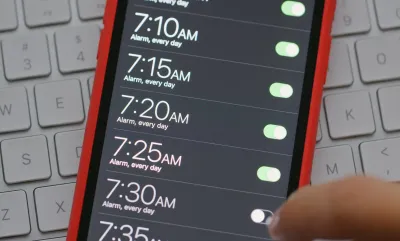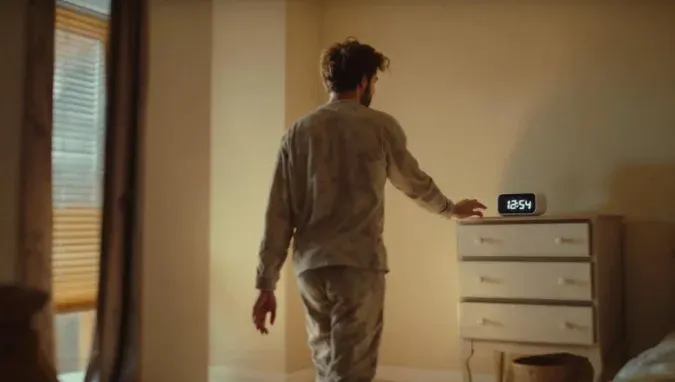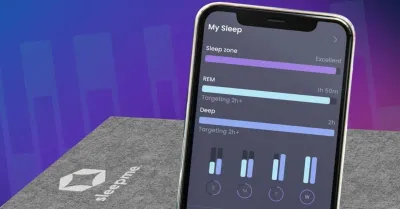
Key Takeaways
Hitting snooze may feel helpful, but it often makes mornings harder instead of easier.
- More than half of people admit to using the snooze button, with most hitting it two to three times before getting out of bed.
- Snoozing breaks sleep into fragments, which can increase grogginess and extend morning fatigue.
- Keeping a consistent bedtime and wake-up schedule helps train your body to wake naturally without relying on snooze.
- Exposure to morning light, whether natural sunlight or indoor lighting, signals your brain to shift into wake mode faster.
- Improving overall sleep quality with smart sleep technology, like the Chilipad Dock Pro, can make waking up feel easier and reduce the urge to snooze.
The alarm goes off, you hit snooze without thinking, and before you know it, ten minutes have turned into twenty. Suddenly, you’re rushing through your morning feeling groggier than when you first woke up. Does this sound familiar?
Overcoming the snooze habit is less about sheer willpower and more about strategic preparation. The key is to create a supportive environment, optimize your timing, and establish a consistent wake-up routine.
Below, you'll find tips and strategies that work to help you stop hitting snooze, wake up on time, and start your day with more energy and control.
The Impact of Hitting Snooze
Before diving into the tips, let’s take a quick look at how snoozing actually affects your sleep. If you often hit the snooze button, you’re in good company, more than half of smartphone users do the same.
On average, people press snooze 2–3 times and end up losing about 11 minutes of real, restful sleep each morning. [1]
Related: Check our blog if you're curious if snoozing is really bad for you.
But for some, snoozing is more than an occasional habit. About 45% of people fall into the “heavy snoozer” category, pressing snooze around four times and spending nearly 20 minutes stuck in the half-awake, half-asleep cycle. [2]
The problem? Those stolen minutes don’t actually give your body the restorative rest it needs. Instead, frequent snoozing fragments your sleep, especially during REM (the stage most important for memory, mood, and energy).
Rather than waking up refreshed, you’re more likely to start the day groggy and behind schedule.
What the data tells us:
- 56% of sleep sessions include at least one snooze.
- Heavy snoozers average 4 presses and 20 minutes in snooze mode.
- Snoozing spikes on weekdays—when they are needed most, and drops on weekends.
Snoozing feels like a quick energy fix, but it often leaves you more tired. A consistent wake-up time and a bedtime routine are much better strategies for staying alert in the morning.
Rise and Shine with the Chilipad Dock Pro
Stop hitting snooze and dreading mornings. The Dock Pro Sleep System cools or warms your bed, and its Warm Awake feature gently warms your bed to wake you naturally.
Wake Up With Light
Light is your body’s strongest wake-up signal. Your circadian rhythm, the internal clock that regulates sleep and alertness, relies heavily on light cues. Darkness triggers melatonin (the hormone that makes you sleepy), while bright light quickly shuts it down and increases cortisol and serotonin to help you feel alert, focused, and in a better mood.
That’s why exposing yourself to brightness right after waking can make mornings feel easier. Open your curtains as soon as you get up to let natural sunlight in, or, if your room is dark or it’s winter, try using light therapy.
Sunrise alarm clocks mimic the gradual rise of the sun, so you wake up refreshed instead of jolted by sound. Light therapy boxes (about 10,000 lux) are another option and can boost energy and alertness in just minutes.
By starting your day with natural light, you’re working with your body’s natural rhythm instead of against it. This means less grogginess and more energy from the moment you get out of bed.

Place The Alarm Across the Room
What's the easiest trick to stop snoozing? Put it where you can’t reach it. Yes, setting it at least 10 feet away forces you to physically get out of bed to turn it off. That short walk does more than silence the sound; it shifts your body out of sleep mode and into wake mode.
Once you’re standing, your brain starts firing up, your circulation improves, and you’re far less likely to fall back into bed. Instead of dragging out the grogginess with multiple snooze cycles, you give yourself a clean break and a better shot at starting the day alert and on time.
Once your brain registers that you need to move to stop the sound, you’ve already won half the battle against the snooze feature.
Sleep Tip: If possible, consider placing multiple devices in different rooms. Set your phone alarm in the bedroom, but place a backup in the bathroom or kitchen.
Warm Awake by Chilipad
If traditional methods leave you feeling stressed or jolted awake, there’s a calmer alternative. The Chilipad Dock Pro’s Warm Awake mode helps you rise naturally, without blaring sounds.
Instead of a loud noise, Warm Awake gently warms, gradually nudging your body to wake up the way sunlight would. This smooth temperature shift reduces sleep inertia (that groggy, heavy feeling when you first wake) and makes mornings feel more natural.
You wake up refreshed, alert, and ready to start your day, without the stress of a harsh alarm.
The final, absolute genius benefit is called Warm Awake which gradually increases the temperature and wakes me up gently without having to use a jarring alarm. I wake up feeling refreshed, warm, and not sweaty, and ready to face the day. - Randy C (Trustpilot Review)
Use a Gentle Alarm Sound
How you wake up sets the tone for your entire morning. Being jolted awake by a harsh alarm can spike stress hormones, raise your heart rate, and make it harder to feel rested. A gentler wake-up approach signals your body to transition more calmly from sleep to alertness.
Other gentle wake-up options include:
- Nature Sounds or Chimes: Birds chirping, soft water sounds, or light bells mimic natural cues from the environment.
- Vibrating Alarms: Wristbands or under-pillow devices are great if you need a discreet wake-up that won’t disturb a partner.
- Smart Alarms with Sleep Tracking: Some apps and devices detect when you’re in a lighter stage of sleep and time the alarm to go off then, helping you wake without grogginess.
- Sunrise Clocks with Sound Pairing: Pairing gradual light with gentle audio (waves, soft music, or white noise fading out) enhances the natural waking effect.

Morning Highlights to Look Forward To
Your brain responds far more effectively to rewards than to sheer willpower. If your alarm feels like a punishment, mornings will always be a battle. The secret lies in creating positive incentives that genuinely motivate you to get out of bed.
- A Favorite Breakfast or Treat: Whether it’s fresh coffee, a protein smoothie, a favorite local breakfast restaurant, or a special breakfast you make only on weekdays, starting the day with something tasty can create genuine anticipation for mornings.
- Prep Breakfast Ahead: Overnight oats, a smoothie ready to blend, or prepped ingredients make it easy to enjoy something tasty right away. Convenience + reward = less temptation to snooze.
- Playing Uplifting Music or a Favorite Podcast: Listening to music that boosts your mood or catching up on an upbeat podcast makes the act of waking up enjoyable and less stressful.
- A Short Mindful Ritual: Activities like journaling, meditation, or practicing gratitude help ease the transition from sleep to alertness and add a sense of calm to mornings.
- Planning Something Enjoyable: Setting plans with a friend, walking with a coworker, or organizing something to get excited about (like working on a personal project, reading, or trying something new) motivates waking up on time.
- A Cozy Environment: Having a beloved mug, warm blanket, sunlight by the window, or nice-smelling candle can turn your morning space into something to look forward to.
- Accomplishing a Tiny Win: Making your bed or ticking the first thing off your to-do list gives a small sense of achievement, building momentum for the rest of the day.
Create a Consistent Sleep Schedule
Set a consistent sleep schedule by establishing a regular bedtime and wake-up time, even on weekends. This helps regulate your body’s internal clock and can improve your overall sleep quality. Others include creating a relaxing bedtime routine, such as reading or taking a warm bath, which is a signal to your body that it’s time to wind down and prepare for sleep.
Did You Know: By hitting the snooze button regularly, you may be training your brain to struggle even more when getting up in the morning.
Create a Morning & Bedtime Routine
Starting your day with something you enjoy—whether it’s a favorite breakfast, a quick workout, or a peaceful moment—can motivate you to get up without hitting snooze. Find activities that excite you in the morning to make waking up something to look forward to and help you rise promptly.
A bedtime routine is equally important as your early routine; a calming and consistent bedtime routine helps prepare your body for restful sleep. This sets the stage for waking up feeling refreshed and minimizes morning grogginess.
Be Patient & Reward Yourself
Breaking the snooze habit takes time, so treat it as a process, not instant perfection. Celebrate small wins and stay committed, even if you slip up.
- Set a realistic alarm: Aim for 7–8 hours of sleep so you’re waking up rested. [3]
- Change your environment: Keep your room cool, dark, and quiet, and place your alarm where you can’t easily hit snooze.
- Act quickly: Sit up, turn on a light, or move right when your alarm goes off to avoid sliding back into sleep. [4]
- Stay motivated: Give yourself positive incentives—like coffee, music, or a few minutes of “you time”—to make waking up more rewarding.
Progress comes from consistency. Each time you skip the snooze button, you’re training your body and mind to wake up with more energy and less stress.
Final Thought: Putting It All Together
Hitting snooze may seem like a harmless way to grab a few extra minutes of rest, but it actually steals valuable sleep, leaves you feeling more tired, and disrupts your morning momentum. You often can feel sleep deprived.
With the right mix of smart strategies, like moving your alarm, exposing yourself to light, using the best cooling mattress topper like the Chilipad Dock Pro, and building routines you actually look forward to—you can train your body to wake up refreshed and ready. Break the cycle, skip the snooze, and give yourself the mornings you deserve.
Frequently Asked Questions: Stop Hitting Snooze
Why Do I Keep Hitting the Snooze Button?
Hitting snooze often happens because of sleep inertia—waking up during a deep sleep phase—or insufficient sleep. Poor sleep quality and late bedtimes make it harder to feel ready to get up when your alarm goes off.
What Are Good Alternatives to Snoozing?
Instead of snoozing, get out of bed right away, expose yourself to bright light, do a short stretch or mindful ritual, and have a morning routine you look forward to.
Does Hitting Snooze Affect My Sleep Quality?
Yes. Snoozing disrupts your sleep cycles and can make you feel groggier. It fragments rest and increases sleep inertia, making mornings harder.
Peer-Reviewed Research References
-
Sundelin, T., et al.
Is Snoozing Losing? Why Intermittent Morning Alarms Are Used and How They Affect Sleep, Cognition, Cortisol, and Mood.
Journal of Sleep Research, 2023.
Study Type: Experimental Sleep & Cognition Study
Key Finding: Found that repeated snoozing increased sleep inertia and negatively affected mood and cognitive performance, despite short-term perceived alertness benefits.
View Study
Source URL: https://pubmed.ncbi.nlm.nih.gov/37829961/
-
Sinha, S.
Why Hitting the Snooze Button May Be Doing More Harm Than Good.
News-Medical, 2025.
Source Type: Science Journalism / Research Summary
Key Insight: Summarizes emerging sleep research indicating that fragmented wake-ups may disrupt circadian rhythms and prolong grogginess after waking.
View Resource
Source URL: https://www.news-medical.net/news/20250521/Why-hitting-the-snooze-button-may-be-doing-more-harm-than-good.aspx
-
Mattingly, S.M., et al.
Snoozing: An Examination of a Common Method of Waking.
Sleep, 2022.
Study Type: Observational & Behavioral Sleep Study
Key Finding: Found that habitual snoozing is common and often associated with later bedtimes, shorter sleep duration, and increased morning sleep inertia.
View Study
Source URL: https://academic.oup.com/sleep/article/45/2/zsab291/6445435
-
Net, S.
How to Sleep: Hitting the Snooze Button Could Have Negative Health Effects, Warns Study.
News Coverage, 2022.
Source Type: Media Report on Peer-Reviewed Research
Key Insight: Reports on sleep studies warning that repeated snoozing may impair alertness, increase grogginess, and interfere with consistent wake-time routines.









